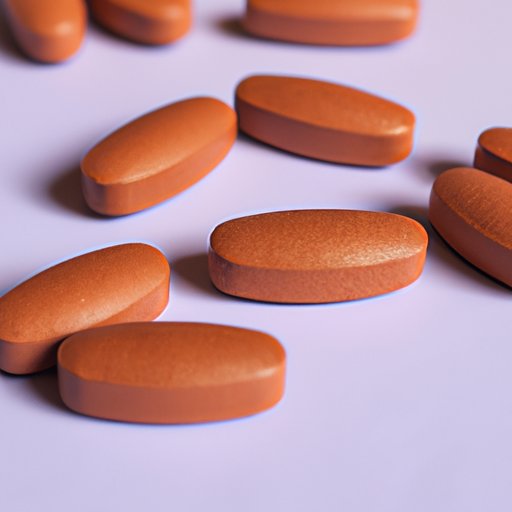
Introduction
Do you ever wonder if beta-carotene and vitamin A are the same thing? The confusion surrounding these two essential nutrients can be overwhelming, and it’s important to understand their differences for optimal health and nutrition. In this article, we will explore the relationship between beta-carotene and vitamin A, as well as the importance of these nutrients for eye health, immune function, and overall wellbeing. Let’s dive in!
The Relationship Between Beta-Carotene and Vitamin A: Exploring the Link
First, let’s define these two important nutrients. Beta-carotene is a type of carotenoid, a pigment that gives fruits and vegetables their bright colors. On the other hand, vitamin A is a fat-soluble vitamin that is essential for various bodily functions, including maintaining healthy vision and immunity.
Interestingly, beta-carotene can be converted into vitamin A in the body. This conversion occurs in the small intestine and liver, where beta-carotene is broken down by enzymes into retinol, the active form of vitamin A. Essentially, beta-carotene acts as a precursor to vitamin A, making it an important nutrient to consume in your diet.
There are two forms of vitamin A – preformed vitamin A, which is found in animal-based foods such as liver and eggs, and provitamin A carotenoids, like beta-carotene, found in plant-based foods.
Understanding Beta-Carotene: A Precursor to Vitamin A
Beta-carotene is a type of carotenoid that has a chemical structure that distinguishes it from other carotenoids. It is commonly found in yellow and orange fruits and vegetables like carrots, sweet potatoes, and pumpkin, as well as leafy greens and other colorful produce like cantaloupe and apricots.
When it comes to supplements, beta-carotene is available in various forms including capsules, tablets, and powders. It is often marketed as an antioxidant supplement and is commonly included in multivitamin supplements.
The Importance of Beta-Carotene for Eye Health and Immune System Function
Vitamin A is important for maintaining healthy vision and immune function, and beta-carotene plays a critical role in ensuring we obtain enough of this essential nutrient. When converted into vitamin A, beta-carotene helps to produce pigment molecules that are essential for healthy vision and prevents macular degeneration and night blindness, which are common among people with vitamin A deficiencies.
In addition to eye health, vitamin A is also important for a healthy immune system. It helps to maintain mucous membranes, which act as barriers against infection, and supports the production of white blood cells that fight against infections and foreign invaders. As such, consuming enough beta-carotene in your diet can help to boost your immune system and protect against illness and disease.
Beta-Carotene vs Vitamin A: What’s the Difference?
Despite their common relationship, there are distinct differences between beta-carotene and vitamin A. While vitamin A is only found in animal-based foods like liver and eggs, beta-carotene is found in many plant-based foods, making it easier for vegans and vegetarians to obtain enough vitamin A. Beta-carotene is also better absorbed compared to preformed vitamin A from animal-based foods, meaning you can consume less and still reap the benefits.
However, excessive intake of either compound can be harmful to health. Consuming too much vitamin A from animal-based foods or supplements can lead to toxicity, causing severe health issues that include joint pain and even death in some cases. Additionally, consuming too much beta-carotene in supplements can lead to a yellowing of the skin, a condition known as carotenemia, which can be alarming though it is not harmful.
Getting More Beta-Carotene in Your Diet: Food Sources and Supplements
If you want to include more beta-carotene in your diet, there are many delicious and nutrient-rich foods to choose from. Some of the best sources of beta-carotene include carrots, sweet potatoes, spinach, kale, apricots, and cantaloupe.
When cooking and preparing these foods, it’s important to note that heat and fat increase the absorption of beta-carotene. Cooking vegetables like carrots and spinach with a small amount of olive oil can help make sure you get the full nutritional benefits of the food.
In addition to obtaining beta-carotene from your diet, supplements may be beneficial for those who have difficulty getting enough vitamins and minerals. Look for supplements that contain natural beta-carotene and follow the recommended dosage closely.
How Much Beta-Carotene Do You Need for Optimal Health and Nutrition?
The recommended daily intake of beta-carotene varies depending on age, sex, and lifestyle factors. Generally, men and women over 19 years old need between 2,700 and 3,000 IU of beta-carotene per day. Pregnant and breastfeeding women and young children may need slightly more.
You can calculate daily beta-carotene intake by checking nutrition labels and keeping track of the foods you consume that contain beta-carotene. If you feel like you may not be getting enough, speak with your healthcare provider about adding a supplement to your daily routine.
It’s important to note that consuming too little beta-carotene can lead to nutrient deficiencies that can impact overall health and wellbeing. In fact, vitamin A deficiency is one of the most common nutrient deficiencies worldwide, resulting in blindness, higher morbidity rates, and even death.
Conclusion
Beta-carotene and vitamin A may be related, but they serve different functions in the body. Understanding the role that beta-carotene plays in our diets is important for maintaining healthy vision and immunity, as well as overall wellbeing.
Include beta-carotene-rich foods in your diet, and consider adding a natural beta-carotene supplement to ensure you’re obtaining enough of this essential nutrient. By doing so, you can help take steps to improve your overall health and reduce your risk for nutrient deficiencies and illness.




